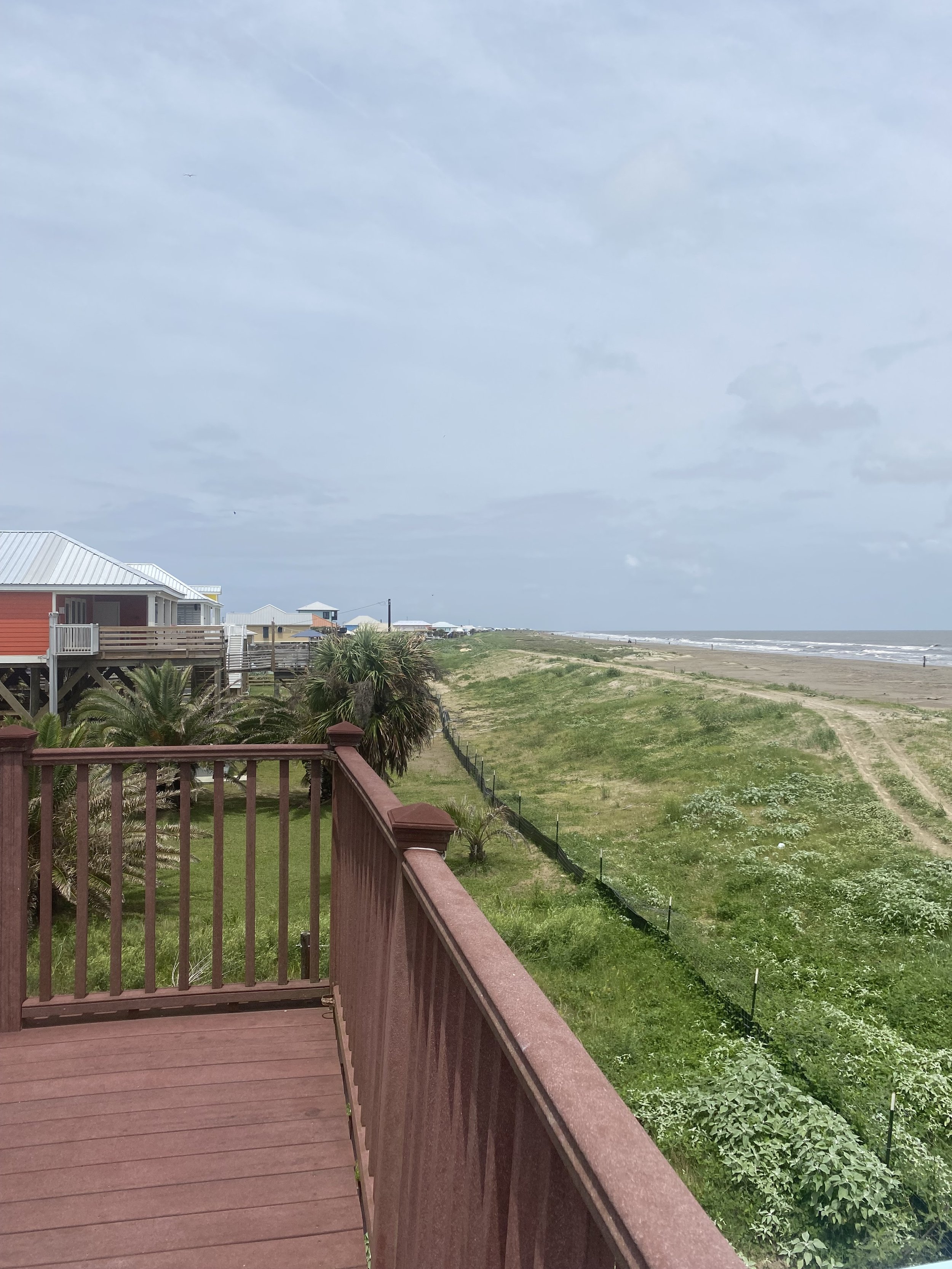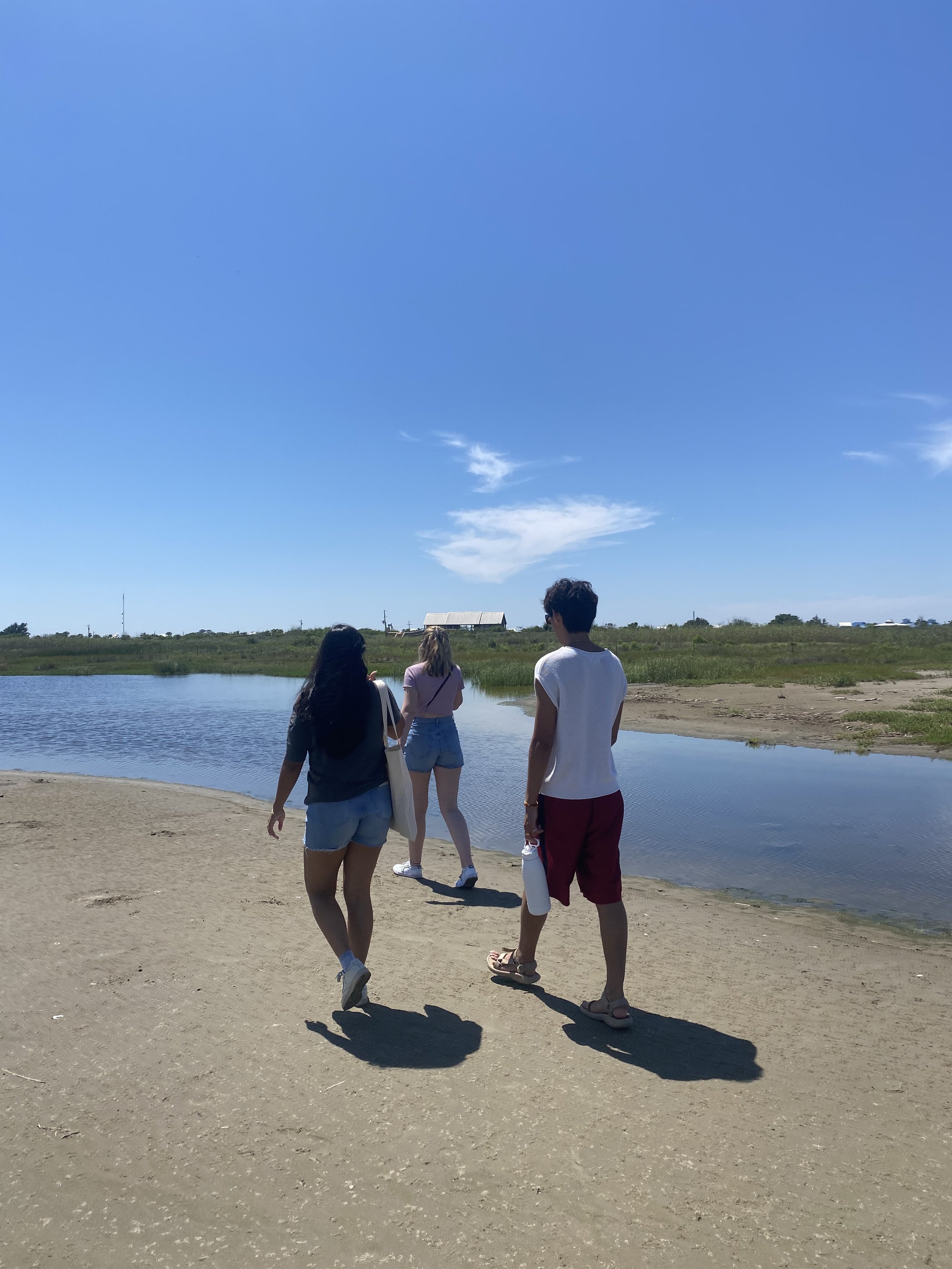The moment we step foot in Louisiana, I feel out of place. Maybe it’s the weary ache of three sedentary hours on the plane, or the dreadful, exciting anticipation that’s been eating at me for the last week as I’ve prepared for this trip—but I feel a distinct sense of unease taking my first ever steps in the South among so many people who I imagine are coming home.
Louisiana doesn’t wait for us to adjust or take in our surroundings. Immediately we’re buffeted by a relentless wind, whipping my hair over my eyes and forcing me to fight for every step. I can’t help but feel like this is a personal confrontation: this state’s way of telling me that I don’t belong here, pushing me out, turning me around while I have the chance. As I wrestle with the draft I find myself thinking about Dorothy and Toto, swept up in a whirlwind of their own that whisks them far away from home, and I have a feeling we’re not in Los Angeles anymore.
“She wanted to swim out, where no woman had swum before.”
Grand Isle is a vast change from Los Angeles, where the traffic backs up for miles and restaurants are packed into every street corner and everybody is clamoring impatiently to get somewhere. Here, the roads are empty with few signs or traffic lights—I struggle to imagine a car accident happening out here, because there are rarely multiple cars on the road at a time. Fishing boats are as commonplace as trucks in driveways. Everything moves at half-speed; even the fish at The Starfish are completely still in their tank, content to float in place rather than expend any energy swimming around.
With all of this change comes self-reflection, which is inevitably followed by self-doubt. I’ve never been more conscious of my own otherness. In grocery stores I get strange, leery looks from men in camouflage and hunting caps. My mosquito bites balloon to the size of baseballs, a symptom of my own body’s incompatibility with the Southern outdoors. My Tory Burch flip-flops stick in mud and get caught on rocks. The country music on the radio may as well be foreign language. I feel bumbling and awkward and estranged, a stupid bird that’s wandered too far from the nest, and this is where the worry begins to creep in: What am I doing here?
“You are burnt beyond recognition,” Mr. Pontellier tells Edna in the opening chapter of The Awakening. It’s one of the first signs that Edna is undergoing a drastic physical change, which is also beginning to alter her on a deeper level. Edna’s quest for self-discovery reminds me of why I wanted to come on this trip in the first place. I wanted to struggle, to change, to challenge my own recognition of myself. I wanted to discover who I was away from everything that I knew, hoping to peel away all of the superficial layers of comfort and familiarity and uncover who I was at the center. But searching for myself here leaves me feeling alienated and alone.
The Awakening isn’t exactly the best distraction from my thoughts of unrest. It’s a quiet, mundane novel without much flashiness or flair; it gives the reader plenty of space on the page to reflect. Edna’s inner turmoil is so grounded and close to my own that it’s hard to think of anything but my own fears and anxieties while I read about hers. The plot reveals itself slowly, in small moments and details—a risque touch on the arm here, a subtly flirtatious comment there—often so discreet that an antsy, overly anxious reader like myself could easily overlook.
“Sometimes I feel this summer as if I were walking through the green meadow again; idly, aimlessly, unthinking and unguided.”
And so, rebelling against all of my instincts, I force myself to slow down and take my time with The Awakening—and I force myself to slow down and take my time with Grand Isle. Instantly the landscape around me becomes more vivid. It’s the small details I find myself most charmed by: a bird with a peculiar muss of hair pitter-pattering beside our beach towels on tiny, rapid feet. The torpid, sleeping cats at Jo-Bobs (we jokingly debate which is Jo and which is Bob). A house that looks no different from the rest of the houses in town, except that it boasts a sign out front that reads “Office”—I amuse myself by wondering who on earth this home office could be for, maybe a local veterinarian or a dentist.
During my first day at Grand Isle, I was so immediately determined to find answers, desperately and obsessively searching for individuality and a sense of self. Naturally all I could think about were all the ways that I didn’t belong in a state like Louisiana. But slowing down and taking my time to appreciate the slowness of life here, I’m becoming more attuned to the smaller details of this environment. In doing so I feel more welcomed. The wind whipping at my face feels more like a passionate embrace than an attack. And the bugs here must love my blood, with the way they leave kisses everywhere on my skin.
“But when she was there beside the sea, absolutely alone, she cast the unpleasant, pricking garments from her, and for the first time in her life she stood naked in the open air, at the mercy of the sun, the breeze that beat upon her, and the waves that invited her.”
It’s far too early in this trip to say with certainty that I’ve discovered myself here, or that I’ve metamorphosed completely into someone new. But what I have discovered is a sense of unity with my surroundings. In our constant search for individuality and meaning, we personalize the world; we feel that it belongs to us, that every creature within our radius exists to service our own journeys to self-discovery. But the more time I spend here, the more I realize how small my own life in California is, a speck of dust in the history of America, in the world. There’s a lot of comfort in letting go of this, even if only for the few moments when rain mists my legs and the ocean crashes louder than my thoughts. I like to imagine that this is what Edna felt in her final moments, too: the lovely peace of being able to exist as part of a larger whole.


